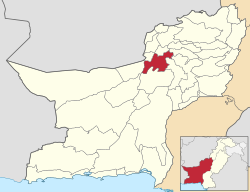Background
Many Hazaras, due to economic problems, travel to far and remote areas in search of employment. One of the locations is Taftan, a border town with Iran, which provides many income opportunities for thousands of people daily. Some Hazaras even move to Mashhad and Tehran to earn a living. [3] As majority of Hazara people are from the Shia sect of Islam, likewise thousands of other people from around the world, go to Iran for the pilgrimage of shrine of Imam Reza.
Mastung is a town located in the north-west of Balochistan. The majority of the population is Sunni Balochs.
Protest and reactions
Protesters held a peaceful protest against the attack on Hazara pilgrims. The protesters demanded the resignation of Balochistan Chief Minister, Aslam Raisani. [7] Thousands of women and children took part in the protest and demanded United nations to take notice of what has been happening to Hazara people [1] Protests, rallies and demonstrations were held in the wake of the terrorist attack in many different parts of the country, including in Karachi, Skardu, Muzaffarabad, Nawabshah, Sukkur, Ghotki and Multan. [8]
The President of Pakistan, Asif Ali Zardari, Balochistan Governor Zulfiqar Magsi, Chief Minister Aslam Raisani, [9] The Universal Muslim Association of America (UMAA) [10] and others strongly condemned the barbaric attack on Hazara Shia minority in Quetta.
The Chief Justice at the Balochistan High Court took suo moto notice of the killings and issued notices to the federal and provincial Government of Balochistan in the wake of the attack. [11]
A committee was formed by Balochistan Chief Minister, to probe the incident and report within 15 days. The committee comprised Interior Secretary Major (R) Chaudhry Qamar Zaman, Inspector General Balochistan Police Rao Mohammad Amin Hashim, Commissioner of Quetta and Khuzdar Division Naseem Lehri, Capital City Police Officer Quetta Ehsan Mahboob, Deputy Commissioner of Quetta Shaukat Ali Maraghzani and Mastung Deputy Commissioner Noorul Haq Baloch. [12]
The license of the company which was carrying the pilgrims was canceled by Home Minister Mir Zafarullah Zehri. [12] Iranian Government closed the Taftan border with Iran after the incident. [13]
This page is based on this
Wikipedia article Text is available under the
CC BY-SA 4.0 license; additional terms may apply.
Images, videos and audio are available under their respective licenses.
